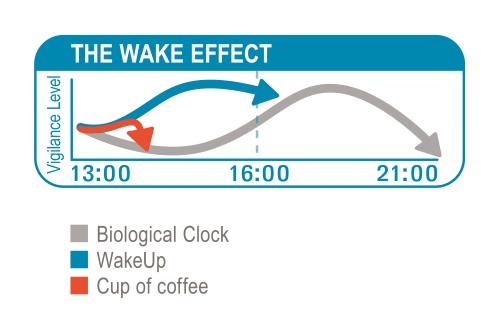A clinical study supports using a new, natural beverage to overcome “Post-lunch Dip Syndrome” (PLD).
Research at the Rambam Health Care Campus and the Technion medical faculty in Haifa, Israel has found the new “WakeUp post-lunch waker” daily beverage helps to alleviate after-lunch fatigue.
The study, published in the Israel Medical Association Journal showed that, unlike caffeine, WakeUp has a long-lasting effect and is not affiliated with elevated blood pressure or pulse rate.
Since PLD is embedded in our biological clock, about seven hours after waking up the body systems actually slow down blood pressure, body temperature and cortisone/cortisol levels drop, and blood glucose levels fluctuate.
The double-blind, placebo-controlled study assessed the effectiveness of WakeUp in combatting afternoon sleepiness.
Blood pressure and pulse were higher two hours after caffeine ingestion, compared to both WakeUp and a placebo.
Unlike caffeine, WakeUp was not associated with increased heart rate and blood pressure.
The results of that study support the product as an appropriate and effective drink to counteract the somnolence and reduced performance in the post-lunch hours and further suggest that a single dose of the proprietary blend of research-backed herbal ingredients in WakeUp is effective in counteracting the drowsiness that occurs after the lunch hour.
In all tests, both WakeUp drink and caffeine beverages were significantly superior to the placebo 30 minutes after lunch.
However, two hours after lunch, performance deteriorated in volunteers who drank the caffeine beverage, while those who drank WakeUp continued to show a significant benefit.
In another study involving 30,000 workers in the US that was published in the Journal of Occupational and Environmental Management, the loss of productive time in the workplace costs more than $135 billion — more than US$100 billion from fatigue and exhaustion that lead to feelings of poor health, and US$35 billion as a direct result of fatigue.
More than 85% of lost time occurred in the workplace, not from absence.
“PLD is a significant and costly problem,” says Eli Faraggi, CEO of Inno-Bev and developer of WakeUp.
“With this afternoon drowsiness comes reduced productivity, lower work quality and an increase in errors, accidents and injuries.”
“Known solutions for PLD, such as drinking coffee or energy drinks, can boost alertness and performance for a short time, but also can raise blood pressure or pulse, impact mood and eventually lose effectiveness due to increased tolerance.”











